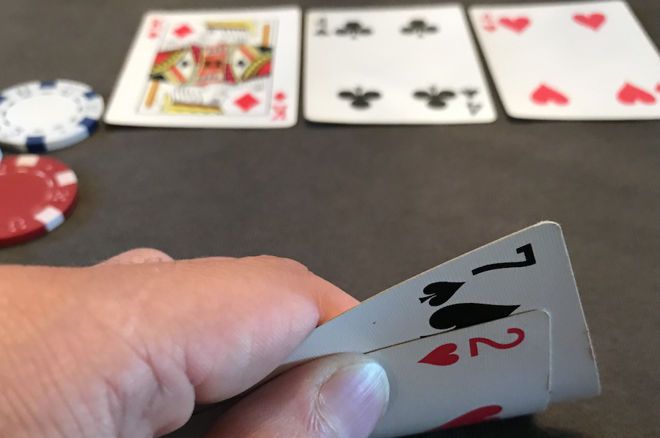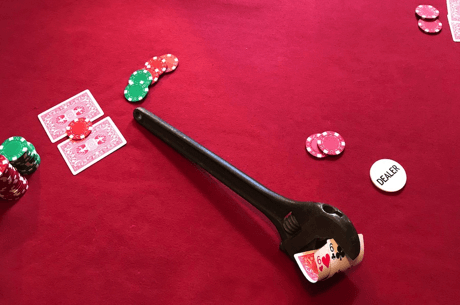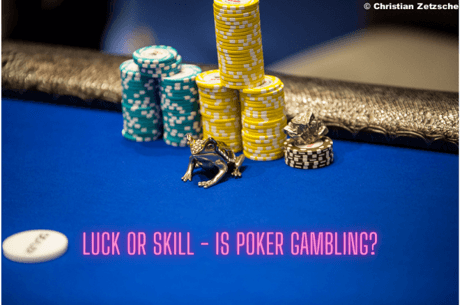Tommy Angelo Presents: LMIP, or Last Money In Pot

Less tanking. More certainty. Less second-guessing. More confidence. Less regretting. More badass.
When you know you've put your last money into a pot unless you improve, you carry a valuable secret. Knowing the future makes you feel safe. And your sense of security will rattle your tablemates, adding even more fun and profit to your game.
I'm talking about the moment in a pot when you raise, bet, or call, and you know, for sure, that this is the last money you are going to put into this pot unless you improve. You're not going to bluff, or value bet, or call a bet.
You've heard of VPIP, for Voluntarily Put Into Pot? Let's call this LMIP, for Last Money In Pot.
Here are some LMIP situations:
Your Final Value Bet of the Hand
This is when you bet or raise with a hand that has showdown value — typically one pair — knowing that if you get raised, you will fold. On the river, LMIP means betting for value, knowing you will fold if raised. On the flop or turn, when you make a LMIP bet, you have decided that unless you improve, you're not going to bet again, or call a bet. In other words, you are done with this hand at the moment you bet.
Here's an example…
Hero opens to 4x on the button with 9♥8♠. The big blind calls. The flop is K♣8♣6♦. Hero has second pair (and no clubs).
Deploy LMIP more. Commit some chips — confidently, purposefully. And at the same time, commit to not committing another chip.
On the flop, BB checks, Hero bets, BB calls. Hero puts big blind on a king, an eight, a six, or a draw.
The turn pairs the six, making the board K♣8♣6♦6♠.
Big blind checks. Hero bets three-quarter pot, and when he does so, he knows that unless he catches a 9x or 8x on the river, this bet is his LMIP.
Here's what that means in long form: If BB check-raises the turn, Hero will fold. If BB calls the turn and bets the river, Hero will fold. If BB calls the turn and checks the river, Hero will check.
There are situations for which the strategy above is impeccable. For those times, LMIP serves as glitch protection. You know what to do. You know when to do it. But sometimes something goes wrong. You stray off course. Maybe you're upset, or tired, or bored.
So you slip up now and then. You send bad money after good. You follow a good bluff with a bad one. You follow a good call with a bad one. Right intention is followed by wrong action.
To do that less, deploy LMIP more. Commit some chips — confidently, purposefully. And at the same time, commit to not committing another chip.
Calling as LMIP
Here's a common situation where using LMIP can plug a leak and bring contentment at the same time.
You have A♣5♦ in the big blind. The button opens to 3x and you call. It's heads-up.
The flop is K♠3♦2♣.
You check, button bets half-pot, and when you call, that's it, you're done. You've already decided that, against this opponent, at this moment, for whatever reasons great and small, thou shalt not hero call. If you miss the turn, and it goes check-check, and you miss the river, and you check again, and now the button bets, you will surrender even though your ace-high might be the best hand.
On the inside, you're smiling. You're happy with how you planned and performed. Whatever the opposite of regret and frustration are, that's what you're feeling when you relinquish your cards.
Pure Bluff With No Viable Outs
These are some of the most profitable plays in poker, because the solidity of your plan allows you to bluff most convincingly. It's a subtle edge, and it matters.
You have 7♠2♥ in the big blind. One player limps. The small blind completes. You check. You're in a three-way pot against two uncreative opponents.
The pot is $15. You prepare to bet $10 on any dry flop.
The flop comes K♦4♣4♥. The small blind checks. You bet $10 as planned.

This is a profitable bluff in two ways. First, it's +EV. Second, you're on firm footing. This bet is never going to be the first step down a spewy slope, because you already decided that if you get called by players like these with a flop like that, it's over. No more barrels. Another perfectly executed bluff failed. Next hand.
Let's replay that hand, but this time you have 2♠2♥ instead of 7♠2♥, and this time there is a possible flush on the flop.
The flop comes K♥4♣4♥. The small blind checks. You bet $10 into the $15 pot with your 2♠2♥. The limper folds and the small blind calls. It's heads-up now.
This is way different than before. If the opponent has a flush draw, your pocket pair is the best hand. But it's still right for your $10 flop bet to be your last money in the pot.
The turn is the 3♠. The small blind checks, and you check behind. The river is an offsuit eight, making the final board K♥4♣4♥3♠8♦.
You (still) have 2♠2♥. The small blind bets $20 into the $35 pot.
And then it starts…
Maybe he flopped a flush draw. He did sort of play it like a flush draw. But he could easily have a four or a king. I think he's got it. Or does he? Maybe he has a busted flush draw, and he thinks I'm on a flush draw too since I stopped betting, and his flush draw is small, so he's trying to push me off my bigger busted flush draw?
There's an official poker term for this. It's called Talking Yourself Into Calling (TYIC). And we know how these stories end. The villain stacks and tips, while you self-berate.
But you can change all that. Strap LMIP onto your poker tool belt and use it. Then use it some more. Eventually, when it's time to just fold, you'll be able to just do it.

World-class coach and author Tommy Angelo is now offering poker pain relief to everyone. You can schedule a call to talk to Tommy about bad betting, bad quitting, bad tempers, or whatever else is hurting your game. Just go to tommyangelo.com. Angelo's first book, Elements of Poker, was called "the seminal poker text of the 21st century" by The London Times, and it has revolutionized the way serious players approach the game.









